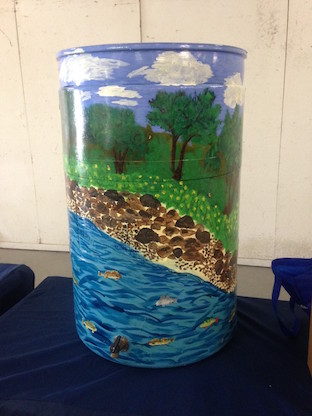
Three simple ways to capture and reuse rainwater include installing rain barrels, redirecting downspouts, and planting native species in and around your garden. Rain barrels are an inexpensive way to save water, and money! Typical rain barrels have a 50-60 gallon capacity, and if used correctly, can save 1,300 gallons of water during a growing season. Rain barrels act as a personal reservoir for your home and garden needs. Anytime your garden needs a drink, simply draw water from your rain barrel! Rain barrels also have other benefits beyond saving water. Rain barrels decrease the strain on public water supply and minimize the amount of storm water runoff, often carrying pollutants, entering our rivers and lakes. To purchase a rain barrel, contact the Lucas County Soil and Water Conservation District at (419) 893-1966.
Another way to reuse rainwater is by redirecting your downspouts onto your lawn or garden, or into a rain barrel. Downspouts often direct rainwater down impervious surfaces like driveways and sidewalks, leading to more runoff into storm drains. However, redirecting downspouts towards a green space, or into your rain barrel, results in rainwater being absorbed into the ground or used to water throughout the growing season. Let’s put this into perspective: According to the USGS Water Science School, 1,743 gallons of water runs off the average roof when 1-inch of rainfall occurs. If collected, that’s enough water to satisfy the needs of the average American family for 5 days! To learn about redirecting downspouts, and other green infrastructure, visit the U.S. EPA’s website.
A final way to retain rainwater this spring is by planting native species in and around your garden. Native plants are beautiful and low-maintenance; they have deep, thirsty roots that help retain water in your garden and absorb extra fertilizer before it can run off your yard. Because of their deep roots and disease-resistant qualities, native plants like the Black-eyed Susan and Coneflower require less water and no added fertilizer. For a list of native plant species, visit Naturally Native Nursery in Bowling Green, Ohio.











